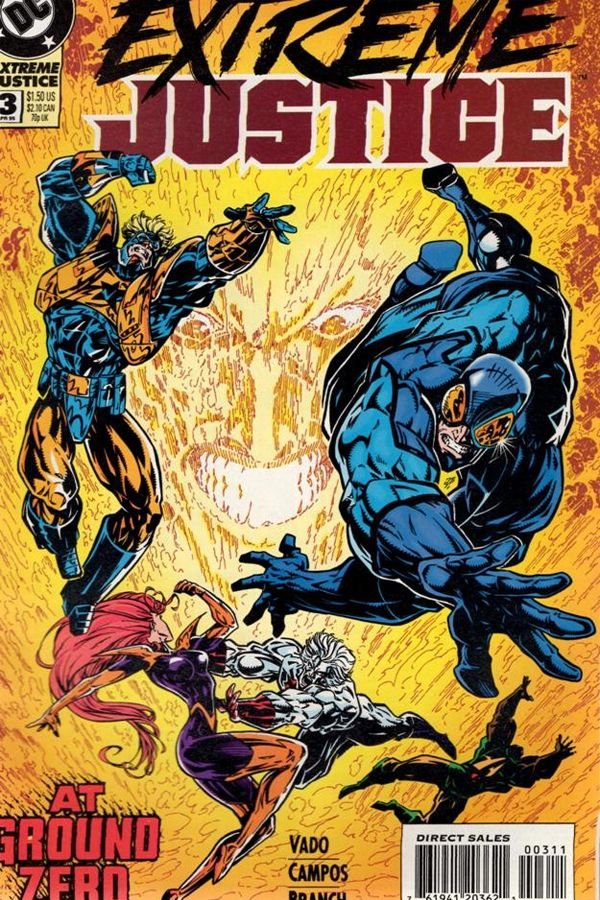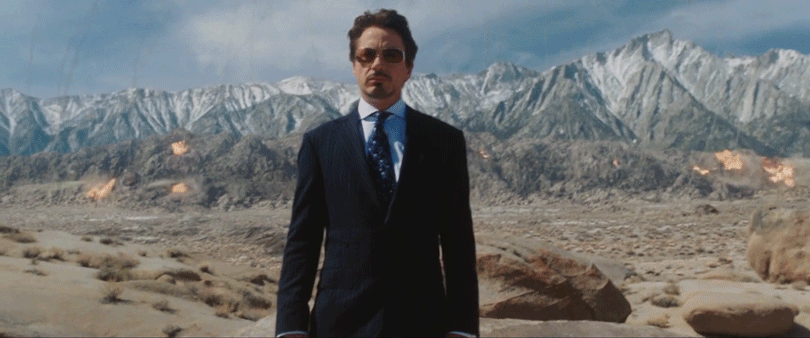“Time they are changing”

Hey Steemians! (Did I use that right? I’m new to the Steemit jargon, so please don’t hate). My name is Murphy and I really love two things: art (movies, music, comics, games etc.) and psychology. These two topics go really well together, as art’s primary purpose is to make people feel something, so I wanna talk about them and share with you guys some of my thoughts on how we experience art, what an artist goes through in their creative process and what can we as individuals learn about ourselves through the lens (ba dum tss) of the media that we consume.
Today, I wanna talk about the latter: what does the media that we consume say about us, as individuals, and why not, as a society.
.gif)
Yeah, sounds a bit ambitious for a first article, but, hey you gotta aim for the stars so that you can at least hit the ceiling.
So, without further ado, our first talking point: What do the arts have to say about us, the people? Well, over the course of history, artistic movements and trends have always served as a distilled, yet accurate representation of the state in which people found themselves at that time. Let’s not forget that artists are also people, although some tend to stretch the credulity of that statement…
.gif)
Nevertheless, they are subject to the same desires, goals and frustrations that we all go through, and it’s from those very human experiences that art is born. Every movie, drawing or song that is made, comes from someone who has felt something and wants to share that experience with other people and, hopefully, find kindred spirits in the process.
So, in short, art is made by people for other people. I know: NO DUH!
But, while that fact seems really obvious, the implication of it is where I wanna get at: the kind art that we create and consume is a mirror of what’s going on inside of us at that given time.
With that established, we can finally move on to the main point of the article: Where are we now?
.gif)
The more savy of you might have already deduced from the title that we’re currently in a transitional phase between two cultural and artistic movements. Specifically, we’re moving away from a post-modernist way of thinking, which I have cheekily dubbed “the cynical movement”, into…something else. I’ve seen names like “alter-modernism” or “pseudo-modernism” floating about, but they’re both kinda superfluous and meaningless, so I’m just gonna call it the “Sincere” movement. (Sincerism?, Sincerity-ism?)*.
Now, sincerity in this context is a bit tricky to explain. It’s kinda like the concepts of “love” and “happiness”: you can’t say exactly what they are, but you can say for sure what they’re not, and Sincerity is not Cynism.
Cynism and the post-modern era of society started somewhere around the 1990s and it came out as a reaction to the overly colourful, family friendly, “everything can be solved with love and friendship” style of the 80’s. Shows like Full House, Growing Pains and the Cosby Show presented a very cheery, upbeat tone in which every week characters found themselves in some “whacky hijinx” or shallow social issues that would sort themselves out all neatly with the characters now having learned a valuable lesson (although not really cause next week they’d go and do it all over again).
That style was good for the time it came out, falling perfectly in line with people’s (well….America’s) general state of being, and desires for a particular kind of message. Now here’s the thing with artistic movements: they get boring, tiresome and even frustrating after a while, both to creators and audiences, and when that happens, a counter movement will follow suite. So it should come as no surprise to anyone that after being flooded with bubble gum cheeriness, shows like The Simpsons and Married with Children came along and were huge successes.
.gif)
This is what huge success looks like.
While they used pretty much the same format as their predecessors, they were absolutely unapologetic in deconstructing and mocking them. We started getting satire, dark and mature comedy, social commentary that wasn’t subtextual in any way, but most importantly, the media and people in general were becoming smarter.
We as audiences started becoming more and more aware of tropes, logical inconsistencies, moral dilemmas that hadn’t been addressed previously, and the art that came out of that new found awareness reflected those themes. Movies got darker and more serious, the music industry started embracing gangster rap and grunge as the future, and even comic books were going through their now infamous “EXTREME!” phase.

EXTREEEEEME!
Now don’t me wrong. It’s not like these themes had not been explored before. They were, but not by the general population. They were not as present in the cultural zeitgeist, but with the emergence of these trends and of THE INTERNET, where people could easily share their opinions, talk with like minded individuals about their shared interests and standards for quality, and, of course, freely criticise other peoples work with nothing holding them back, we slowly became a society of “know it alls”.
.gif)
Now I’m not saying that like it’s something wrong, just as a fact. The phrases “everyone has an opinion” and “everybody’s a critic” are extremely true, regardless of what tone or connotation you give them.
But, because post modernism is based on criticizing the wholesome approach that it’s predecessors had, that means that it needed to be detached from the grandiose, “silly” emotions and stories that made that approach so appealing in the first place. Having more knowledge and awareness led to a cold detachment and disregard from anything that didn’t seem realistic, logical or “smart”; or from anything which resembled passion, emotion, or was “pink and fluffy”.
I could go on about the post modernism’s characteristics and the impact which it had on society for hours, but I hope that I’ve managed to give you a clear image of it by now. If not, or if you want a more in depth analysis of the movement, I recommend Will Schoder’s amazing video essay “The Problem with Irony”, which I will link at the end of this article, but as a very brief summary of the whole post-modernism era and it’s flaws, I think Yahtzee from Zero Punctuation said it best.
So that’s where we’ve been for the last two decades or so, but a new day is dawning and people are once again getting fed up with the status quo. We’re tired of overly realistic and bleak stories, characters that are incapable of showing any other emotion than angst and grim determination, and, most annoyingly, the “too cool to care” attitude that leaves us feeling nothing. Enter Sincerity and the Marvel movies.
.gif)
Don’t close that browser tab! I like the Marvel movies, but that’s not the point. I don’t think it’s a coincidence that Iron Man 1 and all subsequent entries in the MCU have been so successful with audiences outside of comic book readers. Comic book stories have always been about people being put in extraordinary situations, managing to overcome them by doing extraordinary things, but Marvel has taken it one step further by making those characters likeable, believable, and most important, relatable.
.gif)
Ok, so you can’t relate to being a narcissistic technological genius playboy, but you can relate to someone who has realised the negative effects of his actions and is now trying to make up for them. It’s a very human reaction.
While the Marvel movies are the clearest expression of this movement, it’s not the only way in which it’s taking shape. Movies like The Nice Guys, La La Land and Kingsman each have a very distinct genre and emotion that they’re trying to convey and they embrace those things whole heartedly, with no shame or fear of coming off as lame. If you’ve been reading comics recently, DC Rebirth is fully embracing the wonder of comic book heroes and the inspiration that they offer. Even a show like Rick and Morty, which can be very nihilistic and cynical, still acknowledges and champions small, yet meaningful and uplifting emotional moments for their characters. (I actually teared up at the end of Season 1, Episode 9, where alternate reality Jerry admitted his love for alternate reality Beth).
A couple of years ago, the elements I just mentioned would have been misused by most creators and misunderstood by most audiences. Genre adaptations were only taking some elements that would pass a focus group discussion, while deliberately leaving out certain elements for fear of audiences rejection. Nostalgia was seen by most creators and audiences as a trick to lure people into buying a product which they wouldn't otherwise care about, and emotional character moments were either based on angst or regret, or even worse, they were played for laughs.
But now, we have all these mediums completely throwing themselves into the beautiful, the unique, the heartfelt, the magical, the simple things that say so much, the quiet, the loud, the pain, the joy, the right and wrong, and every other end of every other spectrum of emotion and concept that you can have, and they all proudly and sincerely say: "This is me! I have a story to live, and I want you to come along with me.“
And the best part is that we want to go along with them.
Thank you very much for making it this far. I’ve added down below links to video essays and articles that go deeper on this topic and some recommendations from different artistic mediums which best represent the Sincere movement.
Next time, I’m going to talk about one particular aspect of film making that has changed over the past years and that is Colour – The hero we need and the one we might finally deserve.
Follow me @moviesandmemes to get notified when that goes up and also subscribe to the Movies and Memes Youtube channel (https://www.youtube.com/channel/UCNRFWXDPxU8EJ61Cl0xvTVg) for some quality, fun time with and at the expense of some movies. Talk to you next time and remember to always have fun.
Viewing recommendations:
- [Youtube] : Will Schoder's David Foster Wallace - The Problem with Irony
- [Youtube] : The Game Theorists' - Gaming is BROKEN! ...What Comes Next?
- Movies and other things : La La Land, The Nice Guys, Guardians of the Galaxy (1 & 2), My Hero Academia (Boku No Hero Academia), Duck Tales (2017).
*Right before posting this I found that this new movement does have a name and it's Post-Post-Modernism. Kinda of a lame name if you ask me, so I'm sticking to Sincerity.
Congratulations @moviesandmemes! You have completed some achievement on Steemit and have been rewarded with new badge(s) :
Click on any badge to view your own Board of Honor on SteemitBoard.
For more information about SteemitBoard, click here
If you no longer want to receive notifications, reply to this comment with the word
STOPDownvoting a post can decrease pending rewards and make it less visible. Common reasons:
Submit
Congratulations @moviesandmemes! You have completed some achievement on Steemit and have been rewarded with new badge(s) :
Click on any badge to view your own Board of Honor on SteemitBoard.
For more information about SteemitBoard, click here
If you no longer want to receive notifications, reply to this comment with the word
STOPDownvoting a post can decrease pending rewards and make it less visible. Common reasons:
Submit